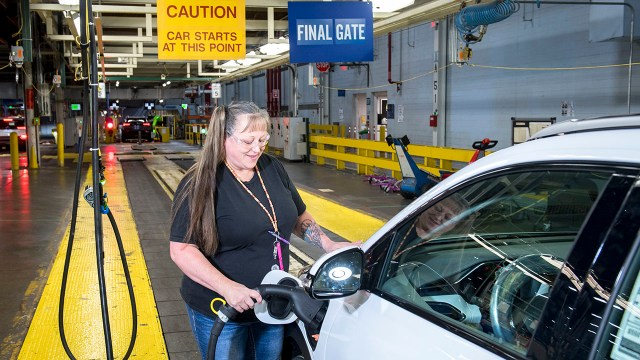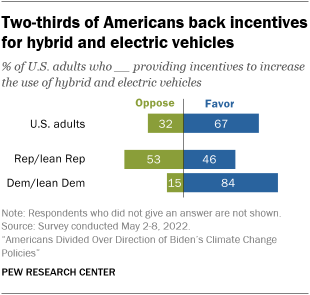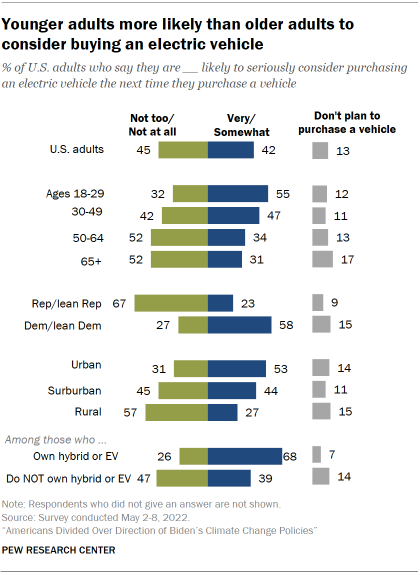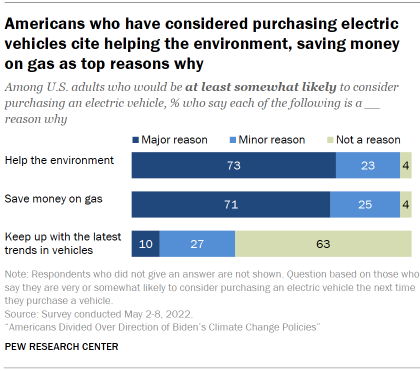
Democrats in the U.S. Senate have reportedly reached an agreement on sweeping climate change legislation that would include tax credits for electric vehicles. A recent Pew Research Center survey – conducted before news of the potential Senate deal – found that a broad majority of U.S. adults support providing incentives to increase the use of electric or hybrid vehicles.
At the same time, however, Americans are divided over whether they personally would consider buying an electric vehicle the next time they’re shopping for a new car or truck, and a majority oppose phasing out gas-powered vehicles in the years ahead.
Pew Research Center conducted this study to understand how Americans view climate, energy and environmental issues, including views of electric vehicles. We surveyed 10,282 U.S. adults from May 2 to 8, 2022.
Everyone who took part in the survey is a member of the Center’s American Trends Panel (ATP), an online survey panel that is recruited through national, random sampling of residential addresses. This way, nearly all U.S. adults have a chance of selection. The survey is weighted to be representative of the U.S. adult population by gender, race, ethnicity, partisan affiliation, education and other categories. Read more about the ATP’s methodology.
Here are the questions used for this report, along with responses, and its methodology.

Overall, two-thirds of Americans support providing incentives to increase the use of electric and hybrid vehicles. Democrats and independents who lean to the Democratic Party are much more likely than Republicans and GOP leaners to say they favor incentives to increase the use of electric vehicles (84% to 46%).
Majorities of Americans overall are also supportive of several other policies to address climate change, including requiring power companies to use more energy from renewable sources.
But while Americans back incentives to increase the use of electric vehicles, they are on the fence about whether they would purchase one the next time they buy a car or truck.
About four-in-ten Americans (42%) say they would be very or somewhat likely to seriously consider purchasing an electric vehicle the next time they’re looking for a new car or truck. A slightly larger share (45%) say they would be not too or not at all likely to do this, while 13% say they do not plan to purchase a vehicle in the future.
The share of Americans who are very or somewhat likely to purchase an electric car or truck is about the same as in April 2021. Since then, the price of gas has increased substantially, from an average of $2.95 per gallon in April 2021 to $4.55 in May 2022 – the month the new survey was conducted. Vehicle prices have also increased amid broader inflationary pressures. On the whole, Americans view electric vehicles as more expensive than gas-powered vehicles, a 2021 survey found.

Those most inclined to consider an electric vehicle purchase in the future include younger adults, urban dwellers, Democrats and those who already own a hybrid or all-electric vehicle, according to the Center’s recent survey.
A 55% majority of adults ages 18 to 29 say they are very or somewhat likely to consider an electric vehicle the next time they buy a vehicle. Smaller shares of adults ages 50 to 64 (34%) or 65 and older (31%) say the same.
Those living in urban areas (53%) are more likely than those in suburban (44%) and rural areas (27%) to report interest in purchasing an electric vehicle.
Democrats are more inclined than Republicans to say they are at least somewhat likely to consider purchasing an electric vehicle the next time they buy a vehicle (58% vs. 23%). Younger adults within each party are more inclined than older adults to say they this. About two-thirds (68%) of those who already own a hybrid or electric vehicle say they are very or somewhat likely to seriously consider purchasing an electric vehicle the next time they’re shopping for a new car or truck. Among those who do not own a hybrid or electric vehicle, 39% say this.

Among Americans who say they are at least somewhat likely to consider purchasing an electric vehicle, large majorities say helping the environment (73%) and saving money on gas (71%) are major reasons. They are far less likely to say keeping up with the latest trends in vehicles is a major reason they would be likely to purchase an electric vehicle (10%).
When it comes to current rates of ownership, around one-in-ten U.S. adults (9%) say they currently own an electric or hybrid vehicle, slightly above the 7% of Americans who said the same in April 2021.
While hybrid and electric vehicle ownership is increasing, the public leans against phasing out the production of gas-powered vehicles.
Overall, 55% of U.S. adults say they would oppose a proposal to phase out production of gasoline-powered cars and trucks by 2035, while 43% support the idea. Opposition today is slightly higher today than it was in April 2021, when 51% opposed and 47% favored the idea.
Democrats and Republicans (including those who lean to each party) continue to be deeply divided over whether to end the production of cars and trucks with internal combustion engines. About two-thirds of Democrats (65%) favor phasing out gasoline-powered cars and trucks by 2035. In contrast, just 17% of Republicans support the idea, while 82% oppose it.
Among Democrats, a large majority of liberals (77%) favor phasing out the production of new gas-powered cars and trucks by 2035. Moderate and conservative Democrats are more closely divided: 55% favor this idea, while 44% oppose it.
The Biden administration has taken steps aimed at ensuring that electric vehicles account for half of all new cars sold in the United States by 2030. While these vehicles continue to account for a relatively small share of all new car sales, the global electric vehicle market has seen growth over the past two years, and automakers like Ford Motor Co., General Motors and others are continuing to invest heavily in the technology.
Note: Here are the questions used for this report, along with responses, and its methodology.